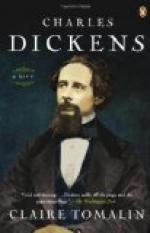And Brother Jonathan, how did he regard his young guest? Well, Jonathan, great as he was, and greater as he was destined to be, did not possess the gift of prophecy, and could not of course foresee the scathing satire of “American Notes” and “Martin Chuzzlewit.” But still, amid all his enthusiasm, I think there must have been a feeling of uneasiness and disappointment. Part, as there is no doubt, of the fervour with which he greeted Dickens, was due to his regarding Dickens as the representative of democratic feeling in aristocratic England, as the advocate of the poor and down-trodden against the wealthy and the strong; “and”—thus argued Jonathan—“because we are a democracy, therefore Dickens will admire and love us, and see how immeasurably superior we are to the retrograde Britishers of his native land.” But unfortunately Dickens showed no signs of being impressed in that particular way. On the contrary, as we have seen, such comparison as he made in his own mind was infinitely to the disadvantage of the United States. “We must be cracked up,” says Hannibal Chollop, in “Martin Chuzzlewit,” speaking of his fellow countrymen. And Dickens, even while feted and honoured, would not “crack up” the Americans. He lectured them almost with truculence on their sins in the matter of copyright; he could scarcely be restrained from testifying against slavery; he was not the man to say he liked manners and customs which he loathed. Jonathan must have been very doubtfully satisfied with his guest.
It is no part of my purpose to follow Dickens lingeringly, and step by step, from the day when he landed at Halifax, to the 7th of June, when he re-embarked at New York for England. From Boston he went to New York, where the great dinner was given with Washington Irving in the chair, and thence to Philadelphia and Washington,—which was still the empty “city of magnificent distances,” that Mr. Goldwin Smith declares it has now ceased to be;—and thence again westward, and by Niagara and Canada back to New York. And if any persons want to know what he thought about these and other places, and the railway travelling, and the coach travelling, and the steamboat travelling, and the prisons and other public institutions—aye, and many other things besides, they cannot do better than read the “American Notes for general circulation,” which he wrote and published within the year after his return. Nor need such persons be deterred by the fact that Macaulay thought meanly of the book; for Macaulay, with all his great gifts, did not, as he himself knew full well, excel in purely literary criticism. So when he pronounces, that “what is meant to be easy and sprightly is vulgar and flippant,” and “what is meant to be fine is a great deal too fine for me, as the description of the Falls of Niagara,” one can venture to differ without too great a pang. The book, though not assuredly one of Dickens’ best, contains admirable passages which none but he could have written, and the description




